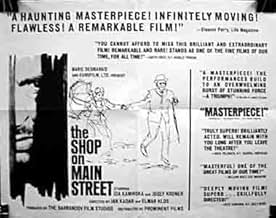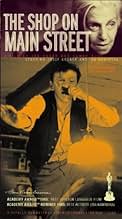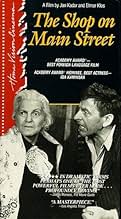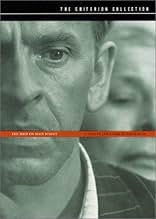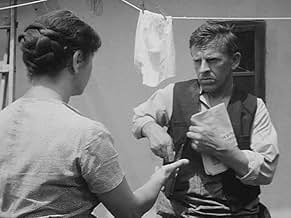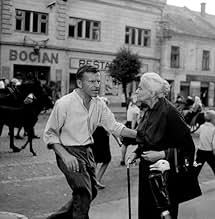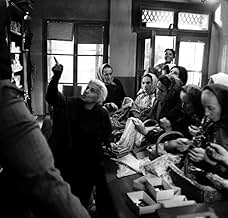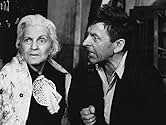IMDb-BEWERTUNG
8,2/10
9950
IHRE BEWERTUNG
Füge eine Handlung in deiner Sprache hinzuA carpenter in the Fascist Slovak State is appointed "Aryan controller" of a Jewish widow's store.A carpenter in the Fascist Slovak State is appointed "Aryan controller" of a Jewish widow's store.A carpenter in the Fascist Slovak State is appointed "Aryan controller" of a Jewish widow's store.
- 1 Oscar gewonnen
- 6 Gewinne & 4 Nominierungen insgesamt
Ida Kaminska
- Rozalia Lautmannová
- (as Ida Kaminská)
Frantisek Zvarík
- Markus Kolkocký
- (as Frantisek Zvarík)
Ladislav Farkas
- Young Man
- (Nicht genannt)
Luise Grossová
- Eliasová
- (Nicht genannt)
Juraj Herz
- Jewish Man
- (Nicht genannt)
Handlung
WUSSTEST DU SCHON:
- WissenswertesThis movie was shot exclusively in the small Slovak city of Sabinov.
- Zitate
Jozef Katz: I don't understand anything any more. But I know one thing. When the law persecutes the innocent, that's the end of it. And those who make the law, too.
- VerbindungenEdited into CzechMate: In Search of Jirí Menzel (2018)
- SoundtracksÉn vagyok a falu rossza egyedül
(uncredited)
Written by Lajos Békésy, Imre Garsi and László Patak
Performed by Jozef Kroner, Frantisek Zvarík, Hana Slivková and Elena Zvaríková
Ausgewählte Rezension
Objective aethetics can sometimes require background information in order to properly judge a piece of art. In the case of this film, it is essential to realize that the film was made under heavy communist censorship. Thus we have plenty of anti-fascist rhetoric as well as the heroic rebel character who abound in Marxist cinema. Yet behind this facade is a devastating critique of the ideology of terror which is the foundation of not only fascism, but the communism of 1960's Eastern Europe.
There's a whole tradition of political film forced to obscure themes enough to slide them past superficial censors and into the minds of a sometimes discerning audience. It can be done by simply universalizing the themes and parallelling the setting with something the audience could recognize. But Chaplin had explored a different method with The Great Dictator, by finding the similarities between two seemingly opposite figures. Through his critique of Hitler, he took on American pomposity and brutality. It is a particularly effective method as it allows the target no way out, turning its own accusations against itself.
Much has been said about the comedy and tragedy's coexistence in this film, and it is indeed an important facet. The simple reason being that life is both funny and tragic, thus to universalize the themes so that any person can be in the Brtko's place, it is imperative to represent both spheres of life.
But the theme is not limited to a broad contemplation on life in the universal sense. There is a much more devestating critique of all totalitarian ideologies. Brtko begins with a simple and, one could argue, natural sense of survival. He is pushed into greed by his wife, and is then pushed into desperation by the his state-sanctioned duty. He finally arrives into a complete state of terror caused by the irrationality of the events around him, and heightened by his relationship with Mrs. Lautmann. Of course, this kind of degradation could happen just as easily under a communist regime as in the days of the Nazis, and this was what the censors missed and the Academy Awards loved.
Few films have the social significance of this one. Not only for its powerful message, but the fact that it is a glimpse into a world we know little about.
5 out of 5 - Essential
There's a whole tradition of political film forced to obscure themes enough to slide them past superficial censors and into the minds of a sometimes discerning audience. It can be done by simply universalizing the themes and parallelling the setting with something the audience could recognize. But Chaplin had explored a different method with The Great Dictator, by finding the similarities between two seemingly opposite figures. Through his critique of Hitler, he took on American pomposity and brutality. It is a particularly effective method as it allows the target no way out, turning its own accusations against itself.
Much has been said about the comedy and tragedy's coexistence in this film, and it is indeed an important facet. The simple reason being that life is both funny and tragic, thus to universalize the themes so that any person can be in the Brtko's place, it is imperative to represent both spheres of life.
But the theme is not limited to a broad contemplation on life in the universal sense. There is a much more devestating critique of all totalitarian ideologies. Brtko begins with a simple and, one could argue, natural sense of survival. He is pushed into greed by his wife, and is then pushed into desperation by the his state-sanctioned duty. He finally arrives into a complete state of terror caused by the irrationality of the events around him, and heightened by his relationship with Mrs. Lautmann. Of course, this kind of degradation could happen just as easily under a communist regime as in the days of the Nazis, and this was what the censors missed and the Academy Awards loved.
Few films have the social significance of this one. Not only for its powerful message, but the fact that it is a glimpse into a world we know little about.
5 out of 5 - Essential
Top-Auswahl
Melde dich zum Bewerten an und greife auf die Watchlist für personalisierte Empfehlungen zu.
Details
- Laufzeit2 Stunden 8 Minuten
- Farbe
- Sound-Mix
- Seitenverhältnis
- 1.37 : 1
Zu dieser Seite beitragen
Bearbeitung vorschlagen oder fehlenden Inhalt hinzufügen

Oberste Lücke
By what name was Der Laden auf dem Korso (1965) officially released in India in English?
Antwort

